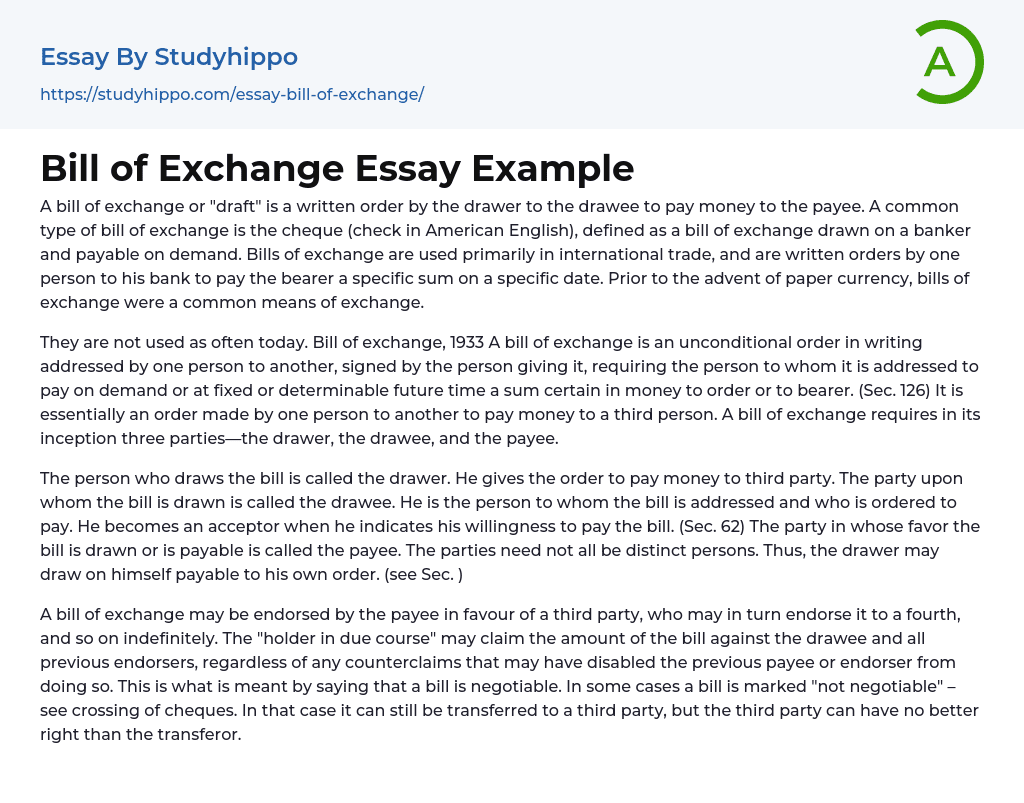A bill of exchange or "draft" is a written order by the drawer to the drawee to pay money to the payee. A common type of bill of exchange is the cheque (check in American English), defined as a bill of exchange drawn on a banker and payable on demand. Bills of exchange are used primarily in international trade, and are written orders by one person to his bank to pay the bearer a specific sum on a specific date. Prior to the advent of paper currency, bills of exchange were a common means of exchange.
They are not used as often today. Bill of exchange, 1933 A bill of exchange is an unconditional order in writing addressed by one person to another, signed by the person giving it, requiring the person to whom it is ad
...dressed to pay on demand or at fixed or determinable future time a sum certain in money to order or to bearer. (Sec. 126) It is essentially an order made by one person to another to pay money to a third person. A bill of exchange requires in its inception three parties—the drawer, the drawee, and the payee.
The person who draws the bill is called the drawer. He gives the order to pay money to third party. The party upon whom the bill is drawn is called the drawee. He is the person to whom the bill is addressed and who is ordered to pay. He becomes an acceptor when he indicates his willingness to pay the bill. (Sec. 62) The party in whose favor the bill is drawn or is payable is called the payee. The parties need no
all be distinct persons. Thus, the drawer may draw on himself payable to his own order. (see Sec. )
A bill of exchange may be endorsed by the payee in favour of a third party, who may in turn endorse it to a fourth, and so on indefinitely. The "holder in due course" may claim the amount of the bill against the drawee and all previous endorsers, regardless of any counterclaims that may have disabled the previous payee or endorser from doing so. This is what is meant by saying that a bill is negotiable. In some cases a bill is marked "not negotiable" – see crossing of cheques. In that case it can still be transferred to a third party, but the third party can have no better right than the transferor.
- Adaptation essays
- Adventure essays
- Adversity essays
- Aging essays
- Alcohol essays
- Barbie Doll essays
- Beauty essays
- Care essays
- Carpe diem essays
- Change essays
- Chess essays
- Chicken essays
- Choices essays
- Contrast essays
- Crops essays
- Development essays
- Dream essays
- Evil essays
- Experience essays
- Family essays
- Farm essays
- Fire essays
- First Love essays
- Focus essays
- Greed essays
- Hero essays
- Holiday essays
- House essays
- Housing essays
- Humility essays
- Humor essays
- Hypocrisy essays
- Integrity essays
- Law of Life essays
- Life Changing Experience essays
- Life Experience essays
- Lifestyle essays
- Limitations essays
- Love Story essays
- Mother Tongue essays
- Motherhood essays
- My Neighborhood essays
- Myself essays
- Mystery essays
- Narcissism essays
- Never Give Up essays
- Nursing essays
- Object essays
- Opportunity essays
- Peel essays




